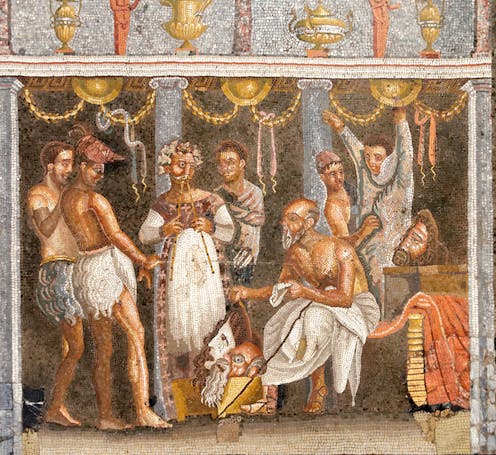a new book on the best lines in Latin misses the bigger picture
- Written by Caillan Davenport, Associate Professor of Classics and Head of the Centre for Classical Studies, Australian National University

One of my favourite Roman artefacts to show visiting school groups or beginner’s Latin classes is a floor mosaic from the House of the Tragic Poet in Pompeii. The mosaic depicts a chained dog accompanied by the Latin words, CAVE CANEM (“beware of the dog”).
The cute familiarity of the image never fails to generate a chuckle or two. But importantly, it provides me with an opening to explore more important issues with the students, from Roman social history to the intricacies of the Latin imperative (used for commands and entreaties, like “beware”!)
Latin is perhaps most familiar today as the language of practical short-cuts (etc, e.g., i.e.) and quotable lines, beloved by creators of school mottos and political speechwriters alike.
Harry Mount and John Davie’s book, Et tu, Brute? The Best Latin Lines Ever[1], brings together many of Latin’s greatest hits, from “Fortune favours the brave” to “Who will guard the guards?” But collecting the lines is easy – the difficulty is trying to work out what they add up to.
Review: Et tu, Brute? The Best Latin Lines Ever – Harry Mount and John Davie (Bloomsbury)
Mount and Davie take the easy way out. “The fundamental reason for reading Latin is because it’s the language of Western civilization,” they write.
I couldn’t disagree more. We should read Latin because it is fun, challenging, amusing, and exciting, not because it forms part of any putative “inheritance” of the West.
But for these authors, Latin exists within a very limited thought-world. Yes, the book contains some funerary inscriptions and graffiti, and the occasional early modern philosopher, but again and again the authors return to the poetry and prose of the late Republic and early imperial period, which have long been the staple of English public (read: private) school and university (especially Oxbridge) curricula.
There is no doubt that within these traditional boundaries, Mount and Davie know their stuff. We are treated to the poetry of Catullus, Horace and Propertius, the satires and epigrams of Juvenal and Martial, and the histories and biographies of Tacitus and Suetonius.
Cicero’s speeches are likewise combed for memorable lines, from the instantly recognisable Cui bono (“Who benefits?”)[2] to his invectives against Mark Antony[3].
Read more: Guide to the classics: Tacitus' Annals and its enduring portrait of monarchical power[4]
The translations themselves are witty and evocative, but the contextual material is often weak or lacking. Catullus’s Poem 16[5], which comes billed as “the rudest poem in Latin”, features raw, confronting, sexually violent language. Yet there is no discussion of why Catullus uses such shocking obscenities or of the purposes of sexual invective in Latin.
The treatment of Ovid, most famous for his Art of Love[6], is little better. While the authors acknowledge that his sexual advice – that young men should take advantage of drunk women and rape them – is “evil” and “wicked”, they also state that Ovid “wouldn’t last a second these days”, as if modern cancel culture is the problem, rather than the poet’s own words.
Read more: Guide to the classics: Ovid's Metamorphoses and reading rape[7]
I acknowledge that, as a university academic who thinks, writes, and teaches about the Romans on a daily basis, I am not the intended audience for this book. Instead, it is clearly aimed at the general reader with no prior knowledge of Latin and Roman history, or those with long-buried school Latin, eager to reacquaint themselves with the language. But I think these readers deserve better than what Mount and Davie have to offer.
Women, in particular, come off badly in this book. This is admittedly, partly the result of the fact that most surviving Latin literature was written by men. But there is something decidedly uncomfortable about the parade of female lovers, goddesses, and Pompeiian sex workers offered here, which is not really alleviated by the inclusion of the famous letter from Vindolanda[8] in which an officer’s wife invites another woman to her birthday party.
I missed texts like The Passion of Perpetua[9], which contains the first-hand account of a young Christian woman from North Africa, written while awaiting execution at the imperial games in the early third century AD. One cannot but helped be moved by Perpetua’s account of her separation from her baby, whom she was still breastfeeding.
After being granted permission to keep her child with her, Perpetua wrote: “prison was immediately transformed into a palace for me, so that I preferred to be there than anywhere else” (factus est mihi carcer subito praetorium, ut ibi mallem esse quam alicubi).
The resonance of these heartfelt words only increases when Perpetua abandons her child, and her life, for her Christian faith.

















